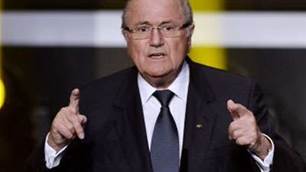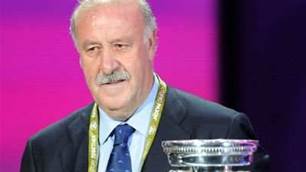Keep your eye on these players once the action gets underway in June...
Cristiano Ronaldo has not always endeared himself to the neutral football fan. When he left his native Portugal to join Manchester United as a precocious teenager there were those who thought Sir Alex Ferguson had spent over £12million on little more than a circus act, a ball juggler with too much attitude and not enough end-product.
Ronaldo infuriated opponents and exasperated his own supporters and colleagues with his swan dives in the penalty area and his over-milked stepovers.
Some put it down to arrogance, others merely to a special talent trying too hard to impress.
Few thought Ronaldo would be plying his trade at Old Trafford for long, especially after that infamous wink at the Portugal bench in the World Cup quarter-final in 2006 after England's Wayne Rooney was sent off.
Ronaldo that night was portrayed as sly, selfish and scheming.
Yet two years later he is on the cusp of announcing himself as the world's greatest footballer at the European Championships in Austria and Switzerland.
The transformation has been as complete as it has been thrilling for the millions who watch the English Premier League around the globe.
Not just the goals he has scored with staggering frequency. And not just the way in which he has dovetailed creating chances and winning matches which has brought so much comparison with the great George Best.
It is the innovation which has been most spectacular.
Great sportsmen are like great explorers. They push back the boundaries. They take risks, take you to places you never knew existed.
Ronaldo has done just that in football every bit as much as his countryman Vasco da Gama who led the first ships to sail from Europe to India.
Evidence: Ronaldo's famous free-kick in United's 2-0 win against Portsmouth.
It defied the laws of kinetic motion that a ball hit so hard could clear the wall and dip so freakishly below the crossbar, all in a space of around 20 metres.
Ferguson has seen brilliant free-kicks in his time from Ryan Giggs, David Beckham and Eric Cantona but he professed: "That, without doubt, is the best."
Ronaldo's headed goal in the Champions League quarter-final against Roma in the Olympic stadium was also a defining moment in his career, the moment which proved that he could also conjure magic on the biggest stage against quality opposition.
It is why the European Championship rostrum awaits Ronaldo's coronation as the king of Europe, just as it once enhanced the legends of Jurgen Klinsmann, Zinedine Zidane and Michel Platini.
But Ronaldo has opposition in his quest to be the most influential player at Euro 2008. Lots of it. And while none of it comes from an Englishman following England's failure to qualify for the tournament, intriguingly much of it comes from the English Premier League.
Other leagues may have more competitive strength in depth. They may be more technically efficient and play at a more patient tempo, but England's mountain of television cash continues to lure much of Europe's top talent.
Which is why so many of the questions at Euro 2008 will surround familiar faces.
Can Fernando Torres produce the kind of searing pace and goal-scoring form he has shown for Liverpool all season when he pulls on the shirt of Spain?
Can Cesc Fabregas transpose the midfield vision he demonstrates week in and week out for Arsenal to the international stage?
If the answers to those two questions are yes then Spain, international football's great underachievers, might at last enjoy success.
There is no reason why they should not do so when you consider their squad is also founded on the rock-like leadership of central defender Carles Puyol and one of the world's best goalkeepers in Iker Casillas.
France, however, will also be one of the favourites. Not because of Thierry Henry, whose season with Barcelona has been disappointing.
But because France, as they demonstrated against England in March, have rediscovered a pleasing blend of attacking football.
The pace of Chelsea's Nicolas Anelka is a threat and all eyes will be on Karim Benzema, the 20-year-old Lyon striker who promises great things.
It is Franck Ribery, however, who has taken over from Zinedine Zidane as their most influential playmaker. He has enjoyed a fabulous season for Bayern Munich.
When it comes to major championships, however, there is one battle-honed team who can never be ignored: Italy.
The world champions do not play the most entertaining football, but there is no better nation at summing up how best to get the job done.
There is no-one more adept than Andrea Pirlo at changing the ebb and flow of a football match, no midfielder grittier than Genarro Gattuso and few strikers more adept than Luca Toni.
The consistency and efficiency of Germany at major tournaments is uncanny, epitomised by Bayern's full-back Philipp Lahm, who could run all day and is a frequent source of goal-saving tackles and accurate crosses. For my money, the best left back around.
They also have Michael Ballack. Yes, I know he has failed to justify his £125,000-a-week wages at Chelsea but in the latter half of this season he has shown signs of returning to the form which made him Germany's outstanding performer in recent years.
More players to watch?
How about Sweden'sZlatan Ibrahimovic, the Inter Milan striker with a volatile demeanour but uncanny creativity for a man of 6ft 5in.
Euro 2008 defenders will hate playing against him.
The same might be said of Holland'sRobin van Persie, whose season at Arsenal was disrupted by injury, but who has the striking guile to make an impact if he can find his true form.
How, too, about Petr Cech, the reason Chelsea concede so few goals and who might just be the best goalkeeper in the world?
But there we are again, back in the English Premier League, back in the sphere of Ronaldo. Back to a player whose courage to run at defenders and keep running at them even when the physical stuff is meted out will make Portugal one of the teams to watch.
Is he the best in Europe?
In my view, yes, although comparisons of footballers who play in different positions are as difficult as they are futile
There is, however, no better way to start an argument. So here goes with my Euro 2008 top 10.
1 - Cristiano Ronaldo (Portugal). A courageous creator and goal scorer. A born entertainer.
2 - Fernando Torres (Spain). Sharp mind. Speedy feet. The sort of striker defenders have nightmares about.
3 - Luca Toni (Italy) A threat on the ground or in the air and possessed of great off-the-ball movement, the Bayern Munich man will hope to follow up a good season in domestic competition with a strong showing for the Azzurri.
4 - Petr Cech (Czech Republic). Struggled with injuries in past year but on form the best goalkeeper in the world.
5 - Cesc Fabregas (Spain). Not at his best for Arsenal this season but a provider of vision and energy in midfield.
6 - Franck Ribery (France). A revelation this season with Bayern Munich. A snappy, scampering midfielder. Makes things happen.
7 - Andrea Pirlo (Italy). Wonderful free-kick taker. Adept at the role of the deep-lying playmaker.
8 - Karim Benzema (France). Free-scoring 20-year-old Lyon striker. Strong, tricky. Possesses huge promise.
9 - Fabio Cannavaro (Italy). Veteran and evergreen defender. At 34 best years behind him but still Italy's cornerstone.
10 - Michael Ballack (Germany). Not set Stamford Bridge alight, but strong, good in the air and invariably delivers for Germany.
Ronaldo infuriated opponents and exasperated his own supporters and colleagues with his swan dives in the penalty area and his over-milked stepovers.
Some put it down to arrogance, others merely to a special talent trying too hard to impress.
Few thought Ronaldo would be plying his trade at Old Trafford for long, especially after that infamous wink at the Portugal bench in the World Cup quarter-final in 2006 after England's Wayne Rooney was sent off.
Ronaldo that night was portrayed as sly, selfish and scheming.
Yet two years later he is on the cusp of announcing himself as the world's greatest footballer at the European Championships in Austria and Switzerland.
The transformation has been as complete as it has been thrilling for the millions who watch the English Premier League around the globe.
Not just the goals he has scored with staggering frequency. And not just the way in which he has dovetailed creating chances and winning matches which has brought so much comparison with the great George Best.
It is the innovation which has been most spectacular.
Great sportsmen are like great explorers. They push back the boundaries. They take risks, take you to places you never knew existed.
Ronaldo has done just that in football every bit as much as his countryman Vasco da Gama who led the first ships to sail from Europe to India.
Evidence: Ronaldo's famous free-kick in United's 2-0 win against Portsmouth.
It defied the laws of kinetic motion that a ball hit so hard could clear the wall and dip so freakishly below the crossbar, all in a space of around 20 metres.
Ferguson has seen brilliant free-kicks in his time from Ryan Giggs, David Beckham and Eric Cantona but he professed: "That, without doubt, is the best."
Ronaldo's headed goal in the Champions League quarter-final against Roma in the Olympic stadium was also a defining moment in his career, the moment which proved that he could also conjure magic on the biggest stage against quality opposition.
It is why the European Championship rostrum awaits Ronaldo's coronation as the king of Europe, just as it once enhanced the legends of Jurgen Klinsmann, Zinedine Zidane and Michel Platini.
But Ronaldo has opposition in his quest to be the most influential player at Euro 2008. Lots of it. And while none of it comes from an Englishman following England's failure to qualify for the tournament, intriguingly much of it comes from the English Premier League.
Other leagues may have more competitive strength in depth. They may be more technically efficient and play at a more patient tempo, but England's mountain of television cash continues to lure much of Europe's top talent.
Which is why so many of the questions at Euro 2008 will surround familiar faces.
Can Fernando Torres produce the kind of searing pace and goal-scoring form he has shown for Liverpool all season when he pulls on the shirt of Spain?
Can Cesc Fabregas transpose the midfield vision he demonstrates week in and week out for Arsenal to the international stage?
If the answers to those two questions are yes then Spain, international football's great underachievers, might at last enjoy success.
There is no reason why they should not do so when you consider their squad is also founded on the rock-like leadership of central defender Carles Puyol and one of the world's best goalkeepers in Iker Casillas.
France, however, will also be one of the favourites. Not because of Thierry Henry, whose season with Barcelona has been disappointing.
But because France, as they demonstrated against England in March, have rediscovered a pleasing blend of attacking football.
The pace of Chelsea's Nicolas Anelka is a threat and all eyes will be on Karim Benzema, the 20-year-old Lyon striker who promises great things.
It is Franck Ribery, however, who has taken over from Zinedine Zidane as their most influential playmaker. He has enjoyed a fabulous season for Bayern Munich.
When it comes to major championships, however, there is one battle-honed team who can never be ignored: Italy.
The world champions do not play the most entertaining football, but there is no better nation at summing up how best to get the job done.
There is no-one more adept than Andrea Pirlo at changing the ebb and flow of a football match, no midfielder grittier than Genarro Gattuso and few strikers more adept than Luca Toni.
The consistency and efficiency of Germany at major tournaments is uncanny, epitomised by Bayern's full-back Philipp Lahm, who could run all day and is a frequent source of goal-saving tackles and accurate crosses. For my money, the best left back around.
They also have Michael Ballack. Yes, I know he has failed to justify his £125,000-a-week wages at Chelsea but in the latter half of this season he has shown signs of returning to the form which made him Germany's outstanding performer in recent years.
More players to watch?
How about Sweden'sZlatan Ibrahimovic, the Inter Milan striker with a volatile demeanour but uncanny creativity for a man of 6ft 5in.
Euro 2008 defenders will hate playing against him.
The same might be said of Holland'sRobin van Persie, whose season at Arsenal was disrupted by injury, but who has the striking guile to make an impact if he can find his true form.
How, too, about Petr Cech, the reason Chelsea concede so few goals and who might just be the best goalkeeper in the world?
But there we are again, back in the English Premier League, back in the sphere of Ronaldo. Back to a player whose courage to run at defenders and keep running at them even when the physical stuff is meted out will make Portugal one of the teams to watch.
Is he the best in Europe?
In my view, yes, although comparisons of footballers who play in different positions are as difficult as they are futile
There is, however, no better way to start an argument. So here goes with my Euro 2008 top 10.
1 - Cristiano Ronaldo (Portugal). A courageous creator and goal scorer. A born entertainer.
2 - Fernando Torres (Spain). Sharp mind. Speedy feet. The sort of striker defenders have nightmares about.
3 - Luca Toni (Italy) A threat on the ground or in the air and possessed of great off-the-ball movement, the Bayern Munich man will hope to follow up a good season in domestic competition with a strong showing for the Azzurri.
4 - Petr Cech (Czech Republic). Struggled with injuries in past year but on form the best goalkeeper in the world.
5 - Cesc Fabregas (Spain). Not at his best for Arsenal this season but a provider of vision and energy in midfield.
6 - Franck Ribery (France). A revelation this season with Bayern Munich. A snappy, scampering midfielder. Makes things happen.
7 - Andrea Pirlo (Italy). Wonderful free-kick taker. Adept at the role of the deep-lying playmaker.
8 - Karim Benzema (France). Free-scoring 20-year-old Lyon striker. Strong, tricky. Possesses huge promise.
9 - Fabio Cannavaro (Italy). Veteran and evergreen defender. At 34 best years behind him but still Italy's cornerstone.
10 - Michael Ballack (Germany). Not set Stamford Bridge alight, but strong, good in the air and invariably delivers for Germany.
Copyright (c) Press Association
Related Articles

Where are they now? Former A-League Euro stars

Blatter not a fan of Euro 2020 format













